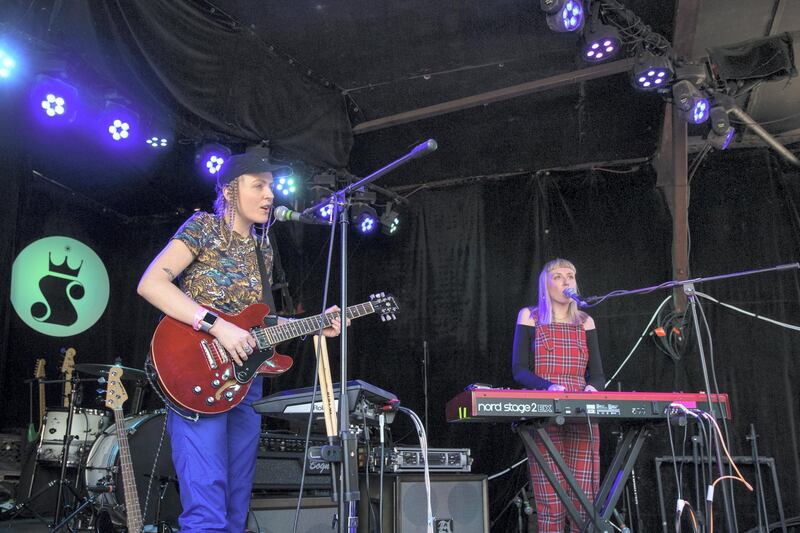Ider are the authors of one of the year's most compelling pop debuts – within weeks of Emotional Education's release, the album has been variously hailed as "a hair's breadth from brilliance" (The Guardian), "a complex, multifaceted triumph" (The Line of Best Fit) and, simply, "the pop debut of the year" (The 405).
So, it's a bittersweet indictment of everything right – and wrong – with the music industry in 2019, when you learn the group's two members both still work in a pub. Well, different London pubs owned by the same people – it's easier to get evenings off at the same time that way.
"It's funny – all these reviews, they don't count cash," says Megan Markwick, the chattier and brasher of the pair, her healthy sense of irony not quite disguising a self-aware bitterness.
"It's a joke – every single shift I've had since the record came out, someone has come in and gone, 'Oh my god, you're in Ider'. This girl came in, took her headphones out – she was listening to Emotional Education – and she walked into the pub and freaked out. I really felt for her. And suddenly I have to be really smiley."
Music unlike anything else out there
What the reviewers and pub-goers alike are responding to is the unfiltered way Markwick and bandmate Lily Somerville – both 27 – have distilled the concerns of disillusioned twenty-somethings into hummable, danceable, but never quite content pop music. Sharing lead vocals in almost every case, the pair's pure harmonies shimmer invitingly, while smuggling jagged slices of millennial cynicism into their "conscious pop" lyrics. Think failed romances, rubbish parents and limited prospects.
"One in four," repeats the short, sweet chorus to Saddest Generation, in reference to the fact a quarter of us will suffer mental health issues in our lifetime. But this bottled generational angst comes shrouded in deceptively bright musical hues. Skirting between electro and pop, with woozy shades of RnB and a neo-folkish lilt, Ider's self-performed and entirely self-written bedroom canvases are painted with warm synths and moody drum machines.
"A lot of the reviews said we don't really sound like much else, which I think is a blessing and a curse, in that it's really hard to sell because people like to pigeonhole things," says Markwick, speaking backstage shortly after the album's release in July. "But then, you have a higher chance of breaking through the noise, and it meaning more to people, and people remembering it – which was so great because that's what we set out to do."
A chance meeting
Both the sturdy melodies and slashing subject matters are the product of Ider’s sisterly friendship and peculiarly idyllic-sounding working environment. Markwick and Somerville were very different people – and much worse musicians – when they met at liberal-leaning Falmouth University, in Britain’s western wilds of Cornwall, while studying for a degree in pop music.
The pair aren't sure how much musical education they received in the strictest sense, but three years playing together amid like-minded peers and sympathetic teachers was uniquely formative. Both trained pianists, they wrote their first song in April 2012 on the guitar and banjo, a restrictive, pastoral pairing, which honed their melodic and harmonic approach.
"That is how we learnt to sing together in the purest form," says Markwick. "On the most basic chords, 'cause I couldn't play guitar and you couldn't play banjo," adds Somerville. "So we were both kind of hashing it out, in the most beautiful way – because we only knew four chords or whatever, that's where the creativity came from."
"We did learn a few more," adds Markwick, defensively, the pair squashed together on two mismatched armchairs in a backstage loft in Gothenburg, where Ider played a late-night set at last month's Way Out West festival, which they already felt too big for.
After a year of forced separation post graduation – Somerville returned to the Midlands, and Markwick went back to London – the pair regrouped in the UK capital in 2016, where they've shared a home ever since. "A lot of chaos" is how Somerville describes their top-floor, two-bedroom flat, one part bohemian artist's dream, another insular emotional refuge. Watching the pair finish each other's sentences, it's clear the bond goes deeper than music.
"We've got two rooms, and they're just packed with stuff," says Somerville. "We sleep in one room, and all the musical instruments are in the other – books everywhere, things on the wall that we've written – different lists, tracklistings. It is everything – it's really that living, breathing thing."
The truth in their lyrics
With no interpersonal inhibitions, the duo were able to channel darker days into verse, acting as each other’s prodding therapists and literary editors alike. They admit the songs are “pretty much” all true, the result of digging up coming-of-age pains and torn diary scraps, sharp edges collectively massaged towards public consumption.
"I'm in my twenties / So I panic in every way / I'm so scared of the future / I keep missing today," begins You've Got Your Whole Life Ahead of You Baby, a response to those evergreen elders always happy to tell a millennial to cheer up. Saddest Generation's verses relive a noncommittal boyfriend's brutal dismissal: "You hated the world and you told me we wouldn't work out / 'Cause you didn't want kids."
"All of our songs are quite explicit. I guess there's so much truth in them, and that's connecting with people," says Markwick. "We really wanted to be honest and true, and we are in our twenties, so I guess, naturally, we would be speaking [for that generation]."
"I don't blame you, I just think you are the reason I messed up / My behaviour is the product of the day you walked out," the pair sing to someone's absent dad on Busy Being a Rockstar, the chorus of which closes with the refrain "When you gonna change daddy, where the [heck] are ya?"
"That's what our relationship has allowed," says Somerville. "All of the songs are rooted in some kind of emotional truth. It's all raw, it's all real, it all comes from something – and it's then just about the best way to tell that story, and that's what we've done for each other, really brought it out. We edit each other's processes and words: could it be said better this way? Could we go deeper this way?"
It’s an undeniably fruitful dynamic, and the very definition of a collaboration being more than the sum of its parts. But parking twee notions of fate, the question potentially worth a lot more than a shift at the pub is where the pair would be if they had never met.
“In Cornwall,” says Somerville. “I think I’d probably be a holistic therapist, and do open-mic nights at the weekends.”
"Personally I've been really thinking about [that]," adds Markwick. "Putting out our first record feels like a huge thing, and feelings and thoughts come with it, and in the recent aftermath I've just been thinking about when we met, and how – thank god we met, because I absolutely don't know … From a personal point of view, music has been like my home, for ever; it is my safe place. Growing up, we've always written songs from a young age, but it wasn't until I met Lil that it became possible. It's like the power of the two of us has ignited a strength and a force, and now we're here, where we are. I didn't think it was possible."
Emotional Education is on Apple Music and Spotify






